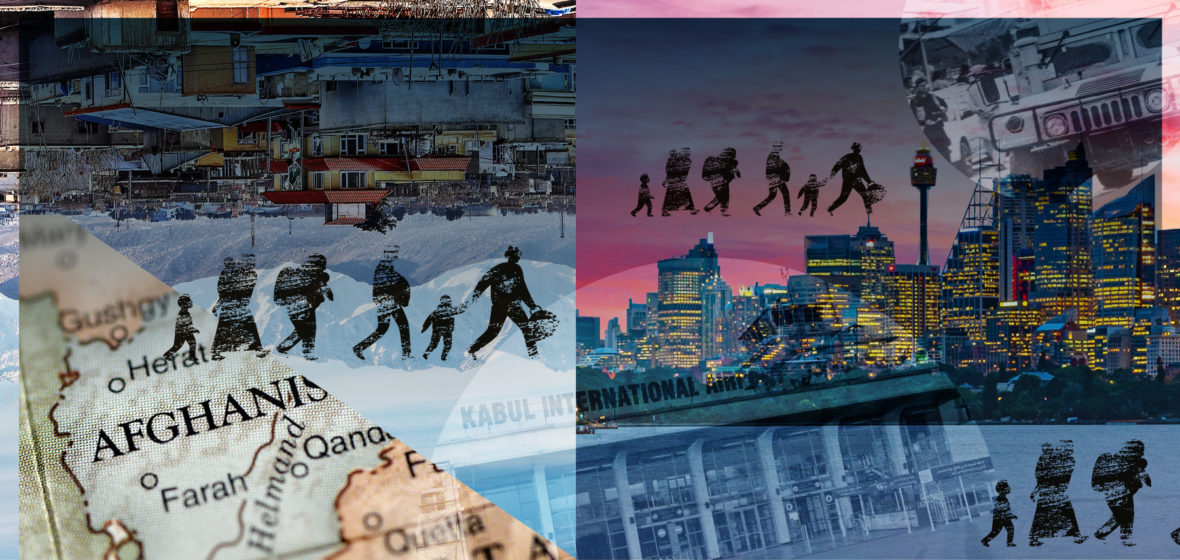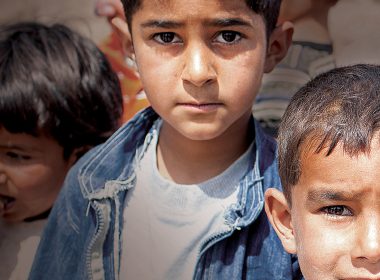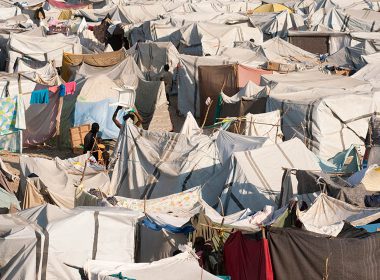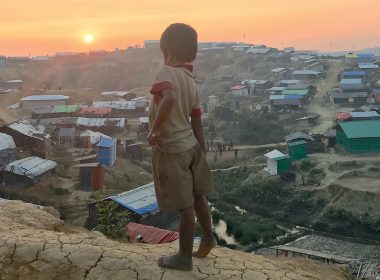For the past year, thousands of Afghan refugees have arrived in Australia seeking a safe haven. Many are solicitors, judges and law students looking to continue their careers in a new country in the face of bureaucracy, prejudice, and trauma.
“I was never happy to leave Afghanistan, my country. I worked for that country, had plans to develop my country, support my people”, Mohammad* admits. Two years ago, he was a lawyer in Afghanistan when the Taliban started taking over province by province. He recalls the danger surrounding him, the more than 20 daily threatening calls from the Taliban telling him they were coming for him.
Mohammad is driven by a diligent passion for the law. In Afghanistan, he worked for human rights organisations, in the finance sector, in an anti-corruption office, and in the communication sector fighting cybercrime. He volunteered at the Afghanistan Independent Bar Association to help those who couldn’t afford the law. Mohammed was an active element of positive change in a country facing a long, arduous road to rebuilding.
He arrived in Australia about a year ago. His family remained behind.
The situation was getting worse every day. I was receiving a lot of threats and couldn’t go back home safely.
An array of support mechanisms
Mohammad is one of the few thousand Afghan refugees granted a humanitarian visa in Australia. Often, charities contact recent arrivals offering programs that provide support, including with finding employment and study opportunities in the country. Aware that many arriving on these shores are experienced professionals in their fields, in some instances, support programs can assign coaches to each registered migrant to help them with their resumés, mock interviews and advice for potential professional opportunities.
For Ahmad*, this was a smooth process. Though he is currently living in Sydney, he first found a role as a legal projects officer at the Sir Zelman Cowen Centre of Victoria University.
“When the government collapsed, I received a temporary visa,” he tells LSJ over the phone.
“They asked us to meet in the airport for evacuation. My family and I tried to get to the airport, but it was very tough, we couldn’t make it there. But in the following days we somehow made it to Pakistan, then Darwin and finally Sydney.”
Ahmad is a resilient man. A law graduate with a Master’s degree in policy and administration, he worked for both local government and the private sector, from projects that helped students gain access to scholarships to supporting Australian organisations and companies navigating Afghan’s department of foreign affairs for trade opportunities. But as the grip tightened around the capital, he and his colleagues submitted requests to leave the country.
“The situation was getting worse every day. I was receiving a lot of threats and couldn’t go back home safely”.
After undergoing hotel quarantine, Ahmad and his wife were lodged at a temporary residence until they could find their own accommodation. This is when he was first contacted by a settlement organisation to sign up for their program to find work in the legal profession.
There are many, like me, who practice law on a highly professional level.
Equivalent systems, unequal understanding
For most law professionals seeking refuge in Australia, the most recurrent issue is that their Afghan qualifications and experience are not accepted in this country. The Islamic Republic of Afghanistan follows the Romano-Germanic (civil law) legal system, but the fundamentals are comparable to Australia’s Common Law.
This frustration is well expressed by Farah,* who was a judge in Afghanistan. Her career was enviable. Ten years of experience led her to become a mentor for new judges in the Supreme Court.
“When I compare both laws, there are some contrasts, but it’s basically the same,” she says.
“I would like the opportunity to tell [those who don’t grant study equivalence to Afghan solicitors] that Islamic Law is not what they’re thinking. Islamic Law is not the Taliban, despite what some people think. And Afghanistan is not a third-world country in legal terms. There are many, like me, who practice law on a highly professional level.”
Farah is all too aware of ongoing prejudice towards her, and of how easily the West connects her country with the Taliban’s oppressive rule, and she laments that this is not a fair representation of her and her peers’ work in actively rebuilding the country.
For Farah, who has an MA in International Law and understands the particular attributes of both Afghanistan and Australia’s legal systems, starting from scratch is a daunting but necessary prospect.
Her experience is slightly different from the others. She arrived in Australia with the help of the International Association of Women Judges, an international organisation helping the family of Afghan female judges to find a safe haven.
But for Farah, this is only the beginning of the journey – first, she says, she needs to learn English, and while nothing was lost in translation in our chat, it’s evident that for someone who wants to wear the robe again, nothing less than perfect will be enough.
Mohammad shares Farah’s concerns about his credentials and experience equivalence. The two systems have enough common ground for him, and as long as he’s told what he needs to study, he’ll understand what needs to be done.
“The law is big and complicated. Even someone who completed their legal qualification in Australia can’t understand it completely”, he says. The implication is that the education process for legal professionals is continuous and never complete; but with his experience and knowledge Mohammad is more than prepared to tackle it.
Mohammad settled in Brisbane with the help of Multicultural Australia. Since then, he’s been trying to align his own credentials with those required in Australia while applying for a job he knows he would be perfect. Opening up, he tells LSJ how he applied for a role he felt he was overqualified for: an entry-level position in a field he knows well. A couple of days later, he received a note stating his application had not been processed because he was not eligible.
“How can this be?” he asks, disheartened. “A person with a Master’s degree and ten years of experience cannot be eligible or even shortlisted for an intern position? Because my name is Mohammad? I don’t know.”
While Mohammad receives support from Multicultural Australia and participated in a couple of mock interviews, he feels the problem now rests with finding the right opportunities where he is living. At the moment, leaving Queensland would be a logistical and financial nightmare.
He is now looking for roles that expand his experience working in common law – a law firm or legal department within government. “Maybe paralegal or legal officer. Or even a compliance officer.”
When I was in Greece, I felt like I had lost everything, but when I came to Australia, I started to realise there’s a world of hope here.
A new start …
Nasrey* is still at the start of his journey. He recently arrived in Australia with his whole family. His father was a military officer, and his sister and brother-in-law were judges. The high profile of his family was a target to the Taliban. When its troops arrived in Kabul, the family escaped with the help of the International Development Association, first to Greece, and finally Sydney. Nasrey was in the last year of his law course, just two months from graduation.
In Sydney, Nasrey was contacted by a settlement organisation during his family’s initial days in Sydney. The prospect was enticing for someone acutely aware that life could start over here for his family. Since then he has had a weekly appointment to discuss the next steps for gaining a recognised law degree. He is now signed up to TAFE to to study for a legal studies certificate. And he was given a laptop too, he says delightedly.
“When I was in Greece, I felt like I had lost everything, but when I came to Australia, I started to realise there’s a world of hope here.”
Not everyone in his family managed to come. One brother was already living in the UK. The other, unfortunately, is still in Afghanistan with his wife and two children, left, he says, in a very bad situation.
For now, Nasrey is focused on finishing his studies. He found a job in a warehouse to show his experience working in the country. When the course ends in December, he’ll be able to apply as a legal assistant in a law firm and, finally, re-enrol in university as soon as possible.
In March 2022, the previous federal Government announced over 16,000 new places for Afghan refugees within the next four years. A campaign for additional 20,000 placements for refugees is being spearheaded by Australia’s Afghan community, with the support of humanitarian organisations, veterans, and citizens. Of those new placements, priority is given to those in the category of Locally Engaged Employee, those with links to Australia (such as those employed by Australian entities), women, girls, and people from ethnic minorities and LGBTIQ+ minority groups. Advocates for increasing the number of refugees accepted here note that an extra influx of specialised professionals eager to contribute to the country receiving them provides an opportunity that can benefit both parties. And, while support organisations, like TAFE, are bridging a gap by helping the refugees’ professional path, teaching them English, and helping people who have endured trauma, these are foundations that still need reinforcement.
Ahmad was contacted by a support organisation five months after his arrival. But by then, support was not needed, as the resourceful lawyer had already done his due diligence and discovered how to navigate the essential bureaucracy for living in Australia.
In Afghanistan we defended the values that Australia believed in.
… but an uncertain future
Others find this situation far harder to manage, and end up waiting too long without enough emotional support or professional help. This leaves those most in need in a limbo of confusion and despair as they wait to kickstart their new lives.
Support for rent for Afghan refugees is minimal – $160 dollars a fortnight is not nearly enough in the increasingly expensive rental market, and its low level adds significantly to the stress level of people already dealing with excessive pressure. These are people who are coping with the trauma of leaving their country behind, their possessions, their lives. And then struggling through refugee camps where they live in the harshest of conditions, with the uncertainty of ever finding a home again.
“The government could provide housing for refugees instead of providing financial assistance fortnightly,” says Ahmad.
There is gratitude, certainly. Farah reports that her family is in contact with friends and colleagues who ended up in different places and struggle with less support than they have in Australia. But being a refugee in a new country means a constant battle for the future prospects of Farah’s family, and gratitude quickly turns to concern over what they’re facing, let alone concern for those who are still back home.
“Please don’t forget about Afghan women, especially Afghan judges”, says Farah. “I have my sisters in Afghanistan. They can’t continue their education and are now just homemakers.”
“It’s a loss for me that I don’t have a job. I cannot continue my career,” concludes Mohammad. “But it’s also a loss for Australia because I have potential, I have talent that’s not being used. And instead, the government is paying me through Centrelink. Why should I not work?”
“We don’t want just help from the Australian government,” he adds. “In Afghanistan we defended the values that Australia believed in. So right now, my family is [under threat] there because of my actions, because I supported the values of this country. So I should at least I have the right to ask the government to bring my family here”.




